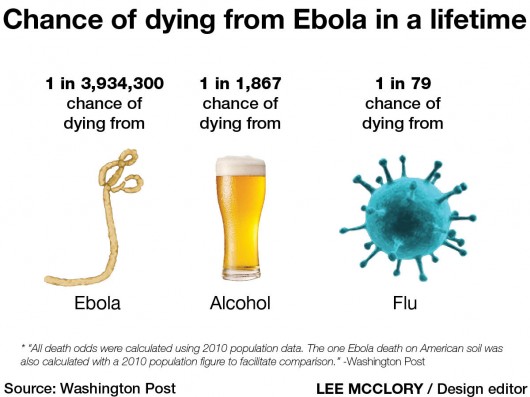While much of the nation might seem to be overreacting about a possibility of the Ebola Virus spreading domestically, students should perhaps be more concerned about catching another virus that is far more contagious — the flu.
“(Ebola) is exceedingly difficult to catch,” said Gladys Gibbs, director of Ohio State’s Office of Student Life Student Health Services. “The flu virus, though, is highly contagious and, unlike Ebola, is much easier to catch and more likely to make you ill.”
According to the Centers for Disease Control and Prevention website, the best way to protect against the flu is to get vaccinated each year. The flu shot or nasal spray flu vaccine are the two best ways to reduce the chance that one will contract the seasonal flu and spread it to others.
The majority of college students avoid the flu vaccine, Gibbs said.
This year, OSU’s Wilce Student Health Center has immunized about 2,800 students, Gibbs said. Those numbers were on par with the annual number of OSU flu clinic patients, she said.
In 2012, 4,851 flu shots were given to students, staff and faculty at the Wilce Student Health Center, OSU Student Life spokesman Dave Isaacs said last October.
The flu vaccine is a preventative immunization covered by insurance through the Affordable Care Act, Gibbs said.
Nationwide, only about 8 percent of college students received the flu vaccine in a recent year, University at Buffalo professor Janet Yang told said in a story by the Huffington Post.
Yang’s online survey of 370 college students in 2010 showed that of her sample, only about 13 percent had received the vaccine during the previous flu season, despite being among populations that had the highest frequency of infection.
According to the CDC, the flu is a common contagious respiratory illness caused by influenza viruses that is spread when people who have the flu cough, sneeze or talk. It can also be spread on surfaces, which is less common.
Meanwhile, Ebola is a rare disease that can only be spread through direct contact with blood or other bodily fluids of a person with a confirmed case.
“The flu actually is an airborne pathogen. If somebody sneezes (or) coughs, not only is there sort of the direct contact if you’re standing in front of someone, there (are) also the surfaces that the virus may actually stay on for some time,” Gibbs said. “Ebola is really much different and actually requires direct contact with bodily secretions.”
Gibbs said behaviors that “don’t necessarily go along with college students,” such as eating well and sleeping well, can help prevent contracting the flu.
“Those are some risk factors that we don’t necessarily perceive when you’re potentially young and healthy,” Gibbs said. “(College students) are sometimes a little more at risk than they perceive.”
Isaacs said these risk factors are amplified “especially with living in close contact with each other.”
Taylor Gilger, a fourth-year in speech and hearing, said getting a vaccine is important.
“I try to get one every year. Being in close proximity, disease usually spreads pretty quickly,” Gilger said. “It didn’t hurt at all.”
Daniel Hohman, a third-year in food science and technology, said he sometimes gets a flu shot, but it depends on the year.
“If it gets bad … If it gets big, I would. I don’t usually get the flu shot, but I think it could be helpful in preventing the flu,” Hohman said.
Others, though, said they have never gotten a flu shot.
“I’ve never gotten one (a flu shot),” said Nicole Joseph, a second-year in political science. “I guess I just didn’t think it was necessary since I haven’t gotten the flu since I was like 3 years old.”
Gibbs said all students are encouraged to be immunized annually.
“The flu hurts a lot more than the flu shot,” Gibbs said.
The Wilce Student Health Center offers flu shot walk-in clinics on certain dates through December, according to a Student Life website.
Flu season can begin in the U.S. as early as October and last as late as May, according to the CDC website.



